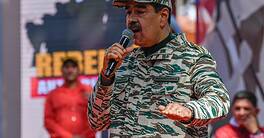Hagar Chemali, an expert in terrorism financing, has worked at the US Treasury, the National Security Council and the UN. She speaks about sanctions—what works, what doesn’t—and Russia.

Global Finance: How effective have international sanctions on Russia and President Vladimir Putin been so far?
Hagar Chemali: The coordination on these sanctions is the most impressive I’ve ever seen. It’s difficult to get the 27 members of the EU to agree on anything, but the coordination on Russia sanctions has been tight and the policies are nearly identical. There has been a proactive effort to have a united front, and there will need to be more coordination on enforcement for years going forward.
GF: Are sanctions imposed today different than the past?
Chemali: Sanctions used to be countrywide blocking systems that usually empowered elites while people suffered. The only example where it worked well was South Africa. The mindset changed after 9/11. People decided that the best way to get at al-Qaeda was to go after its money. The office that I joined in 2006 created the authority to go after terrorist assets and now that office has sanction regimes for almost every national security issue. Today, sanctions are more targeted financial measures against individuals and entities.
GF: How painful will sanctions be to Russia? Will they change Putin’s mind about the invasion?
Chemali: Nobody expects Putin to change his behavior solely because of sanctions. They are meant to be part of a broader strategy that is multilateral in nature. However, sanctions can have a genuine effect when a country is as integrated into international trade as Russia. I don’t think Putin expected the sanctions to be this bad or he wouldn’t have left Russia’s foreign reserves in the US and Europe. They really tighten the financial noose around his neck. Sanctions alone won’t change his mind, but they help undermine his war machine.
GF: How have businesses with significant investments and trade relations with Russia reacted to the sanction regimes?
Chemali: A lot of businesses took the initiative to stop doing business with and in Russia. That’s the power of sanctions. When the US imposes sanctions, it essentially isolates the target from the US financial system, and that unleashes global forces. International players don’t want to do business with a target of US sanctions because of reputational risks. They also don’t want to get in the crosshairs of US authorities. So, companies like BP and Shell are deciding to divest from Russia and cease purchasing Russian oil on their own.
GF: What are the chances that secondary sanctions will be imposed on businesses and countries—notably China—that continue to trade with and invest in Russia?
Chemali: There are no secondary sanctions on entities doing business with Russia. That would require congressional approval. Only Iran and Hezbollah have secondary sanction regimes. I don’t think the US would be afraid to sanction China if it facilitated Russia’s aggression. China won’t sanction Russia anytime soon, but it also doesn’t want to violate existing sanctions. The Chinese recently refused to send airplane parts to Russia because they often include American parts in the production line. President Xi [Jinping] and China know their power comes from their economic prowess. They will be shrewd about what they do to support Russia.
GF: If sanctions don’t end the war, what should the global community’s next steps be?
Chemali: We should offer Putin something. We already appeased him, and we need to end this war. I believe his original three demands were that NATO not expand east, Ukraine never become a NATO member and military assets be moved out of Eastern Europe. We said that all those demands were nonstarters. I don’t like any of the demands either, but it’s better to have a debate about NATO [than have the war continue]. NATO expansion wasn’t the only reason Putin invaded Ukraine, but since it was part of his original demands, why can’t we have that conversation? It’s the elephant in the room.



